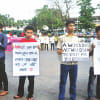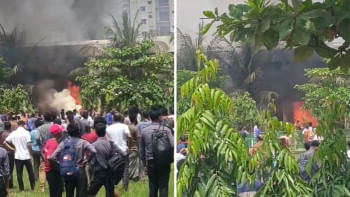‘Violence against women is a violation of human rights’

Shima Moslem, joint general secretary of Bangladesh Mahila Parishad, talks with Naznin Tithi of The Daily Star about why it is absolutely necessary to bring changes in the laws and society's discriminatory attitude towards women and invest more in the right places to prevent gender-based violence.
According to Bangladesh Mahila Parishad's data, in November alone, around 191 women and girls faced various forms of violence across the country. During this time, 36 women and girls were raped, 45 of them were murdered, 15 women and girls died by suicide, while there were 20 reported mysterious deaths. The figures are alarming… Why are we failing to prevent gender-based violence?
The more women are making themselves visible through participating in the labour force—working in government offices, police, military, NGOs, businesses—the more they are facing violence. Our social customs and norms are to blame for this violence, as they support such discrimination. Additionally, lack of enforcement of existing laws, the long legal process to get justice, and the culture of impunity enjoyed by the rapists and other perpetrators are deteriorating the situation. There are still many discriminatory clauses in our family laws: our inheritance law, those relating to the guardianship of children, and divorce laws, among others, are perpetuating gender-based violence.
While rape, gang-rape and murders are the most heinous forms of violence, women also fall victim to kidnapping, trafficking as well as cyberbullying or online harassment. In recent times, cyberbullying has particularly taken a dangerous turn. Women and girls are increasingly being harassed through social media platforms. In 2022, a survey on 514 women found that 63.51 percent were victims of cyberbullying. We regularly see how women and girls are bullied and humiliated, how fatwas are given against women, and how hatred is spread against them on social media. Even positive news or achievements of women are treated very negatively. We have a law to take action against such crimes, but it is rarely implemented against the perpetrators. One of our recent studies found that teenage girls are increasingly becoming victims of violence, while teenage boys are becoming the perpetrators.
What changes do we need in our laws to ensure rape survivors can get justice?
Some important reforms have been made in our rape laws in the past few years. The controversial two-finger test, which violates rape survivors' basic rights, was banned in 2018, and the use of character evidence in rape prosecutions has also been disallowed. These are the result of a decades-long movement by women's rights organisations. Rape victims can now file cases with any police station, which was not possible previously. But still, rape survivors themselves have to prove that they were raped. This must change. Then, we need to do away with the archaic definition of rape. Besides, arranging marriage of rape survivors with their rapists through shalish must stop. While some domestic violence cases may be solved through shalish, rape cases cannot be negotiated this way. Additionally, the witness protection law needs to be strengthened since witnesses often face torture or violence. However, legal reforms alone cannot help survivors get justice; a strong social support system is needed to help them.
Recently, it was reported that more than a hundred child marriages took place in a single union of Bhola Sadar upazila in the past one year. Why haven't we been able to stop or reduce child marriages?
Recently, Mahila Parishad did a survey on child marriage and found that many well-off families are marrying off their daughters at an early age. This has proven that our perception about child marriage—that it occurs mostly in poor families—is wrong. The reality is, till today, families do not want to take responsibility for their girl children, considering them to be a burden. Many marry off their teenage daughters because they think the demand for dowry is less for a child bride. So, poverty or safety issues are not the main factors behind child marriage, it is the discriminatory mindset of our society.
We have seen that these marriages take place with fake birth certificates, given by the local UP chairman or local notary public, or faked in local computer shops. Besides, the Nari Nirjaton Protirodh Committees (NNPC), formed in every union, upazila and district to combat child marriage and violence against women, are not functional at all. We also know how the special clause in the Child Marriage Restraint Act is actually promoting child marriage. We are advocating for the amendment of this clause.
On one hand, we are witnessing increasing levels and forms of gender-based violence, and on the other, there is an overall apathy of the society towards such violence and its victims. Why is that?
Our society still considers violence against women to be a women's issue and holds the view that only women should talk about it or protest it. But it's not a women's issue but, essentially, one of human rights. If women fall behind due to discrimination and violence, will society progress? At the World Conference on Human Rights, which took place in Vienna in 1993, it was first mentioned that women's rights are human rights, and violence against women is a violation of human rights. So, as long as we consider this violence to be a women's issue, changes will not come. We need to take a coordinated, holistic approach along with gender-sensitive, integrated state policies to prevent violence against women. It is also crucial to include men and youths from all walks of life in our movement.
What kind of investment is the government making to prevent gender-based violence?
The investment the government has made is not adequate. We have some infrastructure but not the institutional capacity to help victims. There are One Stop Crisis Centres (OCC), Victim Support Centres (VCS) and DNA-testing laboratories in some districts, but their numbers are very limited. Besides, when a girl or women faces violence or is raped, she and her family needs to spend money for her treatment and counselling. Many women are compelled to quit their jobs after facing violence. Therefore, they need to be financially compensated, and the government needs to invest here more. There is a fund to help survivors in this regard, which is not adequate, and there is hardly any monitoring to ensure victims actually get compensation.
Moreover, there is a significant relation between violence against women and a society's economic situation. An IMF study has found that if violence against women and girls increases by one percent, economic activities fall by nine percent. This means preventing this violence will help the nation progress economically.
We know the government has created a gender budget to achieve its gender equality goals. Sadly, the funds are not utilised properly. Gender budgeting in Bangladesh initially started with four ministries, which has now expanded to 44 ministries. All these ministries have specific programmes, aiming to reduce discrimination between men and women. But there is no monitoring of whether this budget is properly spent. Just allocating a lump sum is not enough; proper policies are needed to spend the money in the right place. There also remains a huge gap between the investment we need and what we are actually getting.
How should the gender budget be spent?
Say, for instance, the government makes a road for development. But, if women cannot go outside the house in that area due to a lack of security and other barriers, will she be able to use the road? So, besides investing in such development, the government needs to ensure safety of women on the road and remove other barriers. For example, the Ministry of Women and Children Affairs can have a mechanism to check if all our government offices and institutions have the necessary support, such as daycare centres, to create a supportive environment for women employees. If not, the budget can be utilised to build such centres.
While we know that violence against women is increasing, we don't have proper data to know the severity of it or to determine the reasons behind the violence. Without proper data and research, we cannot formulate the right policies to prevent this violence. So, investment is also needed here.
What about the private organisations? Do they have any such budget?
Private organisations are the worst in this regard. The government is obliged to give six-month maternity leave to working mothers, but very few private companies provide such leave. While some provide only one- or two-month leave, there are many that do not provide maternity leave at all and even lay off workers after they go on such a leave. Private and corporate sectors and NGOs need to invest so that women can work with their full capacity without any hindrance.
Views expressed in this article are the author's own.
Follow The Daily Star Opinion on Facebook for the latest opinions, commentaries and analyses by experts and professionals. To contribute your article or letter to The Daily Star Opinion, see our guidelines for submission.

 For all latest news, follow The Daily Star's Google News channel.
For all latest news, follow The Daily Star's Google News channel. 







Comments